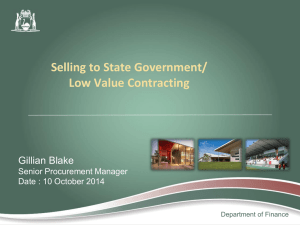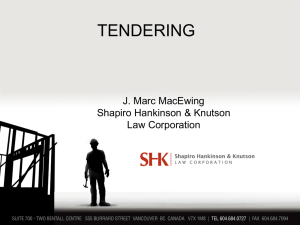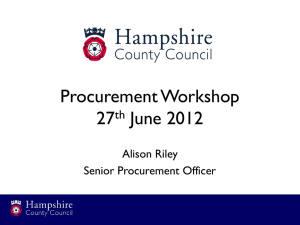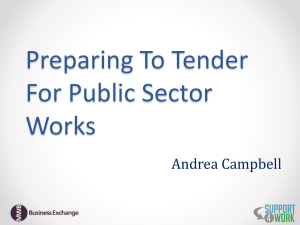Steps in the Procurement Process - Ministry of Finance and the
advertisement
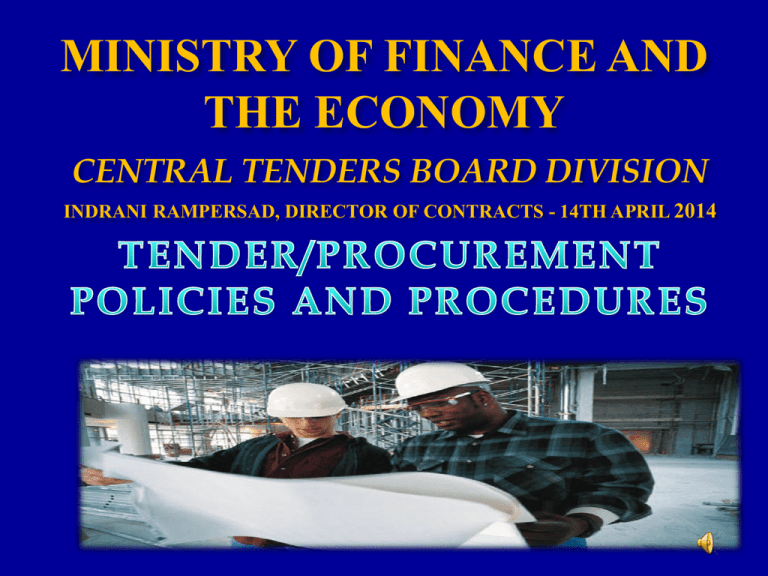
MINISTRY OF FINANCE AND THE ECONOMY CENTRAL TENDERS BOARD DIVISION INDRANI RAMPERSAD, DIRECTOR OF CONTRACTS - 14TH APRIL 2014 1 TENDERING PROCEDURES • Distinguished Members of the Head Table, • Senator, the Honourable Mr. Larry Howai, Minister of • • • • Finance and the Economy and other Ministers Mr Vishnu Dhanpaul, Permanent Secretary, Ministry of Finance and the Economy and other Ministers Chairmen and Directors of State Agencies Ladies and Gentlemen Greetings , a very good morning to all 2 TENDERING PROCEDURES It is indeed a privilege and an honour to be invited to address this august gathering on tendering procedures. As we strive to practice Good Governance, we must implement and practice policies and procedures that would ensure: • Transparency; • Accountability and; • Economic Efficiency, in all our operations 3 TENDERING PROCEDURES • Many State Agencies possess Tendering Policies and Procedures which may be : In accordance with their own legislation of creation; Formulated in alignment with the Central Tenders Board Act and its Regulations; Commissioned and adopted by the Board of Directors; The standard procurement procedures for State Agencies and Statutory Bodies as compiled by the Investment Division, Ministry of Finance and the Economy. 4 TENDERING PROCEDURES • Few State Agencies surprisingly, do not possess any • • formal policies and procedures for their tendering process. Acquisition for goods and services is done on an adhoc basis. Many times this is discovered when there is an appearance, fortunately, before the Public Accounts (Enterprise) Committee and this fact is placed in the Public Domain. 5 Procurement in the State Agencies • Procurement in the State Agencies may be governed • by fragmented legislative framework that does not have the required enforcement. However, there are policies and procedures that exist to ensure: • Transparency • Accountability • Value for Money 6 Procurement – Government of the Republic of Trinidad and Tobago • The Government of Trinidad and Tobago is considered to possess one of the best mechanisms for procurement policies among developing countries. • Recently, consultants from Humprey and Armstrong of the United Kingdom aired this view. They enquired as to why there was a different view based on international statistics 7 • It is in the public domain that Trinidad and Tobago ranked at No. 91 out of 183 countries on the scale of corruption, according to Transparency International 2011 Corruption Perceptions Index. • It is noted that Procurement Officers in various State Agencies try their level best to award contracts on a timely basis at the behest of a resolution by the Board. 8 Procurement – Government of the Republic of Trinidad and Tobago • However, this may cause the established policy and procedures to be contravened without plausible reasons • There are insufficient mechanisms to enforce the tenets of good corporate governance – deterrent nor punitive. 9 Public Procurement • Public Procurement is one of the most vital components of a country’s public administration that links the financial system with economic and social outcomes. • The execution of procurement policies and procedures reflects the degree of governance and performance as regards the delivery of Goods and Services to the communities. 10 Public Procurement • This cuts across every area of: Strategic Planning Program/Execution and Project Management Financial Management • Needless to say, Public Procurement manages almost 30% of the Gross Domestic Product. 11 Public Procurement • A Public Procurement system should optimize the • wide-ranging national benefits by effective economic efficiency. On the other hand, weaknesses in the systems of public procurement would: Under-deliver to the National Community; Support Wastage of Limited Resources; Increase risks for foreign investment. 12 Public Procurement • Procurement is not only accessing goods and services • at the lowest cost from inputs to outputs. Public Procurement should also add values to the outcomes of value for money. In so doing, it is necessary to: Promote innovation and sustainability; Discover the optimum solutions to the issues; Be in tandem with the national objectives. 13 Public Procurement • The quantitative and qualitative significance of the Public Sector Procurement should therefore not be taken for granted .It is an important tool that enables delivery of services to the various publics • There is a process, which when followed enables the execution of procurement to be completed with transparency, accountability and value for money. 14 The Procurement Cycle • I have revised this Cycle in accordance with the practicalities of the requirements when procuring goods and services on behalf of the Government. • This was done in tandem with the existing established policy directives and the international best practices. 15 THE PROCUREMENT CYCLE - Determination of needs/ - Preparation of Scope of Works/Terms of Reference - Report on the Performance of the Contractor/Consultant - Lessons Learnt. 14 - Contract Administration. - Payment for Deliverables - Receipt of Deliverables 1 13 2 12 3 - Project Management - Instructions to successful Tender - Invoice Orders Award of Contract Issuance of letter of acceptance - Reconciliation of needs and available Funding. - Verification of Estimates and Budgetary Allocation. 11 10 4 9 Selection of Supplier/ contractor/ consultant - Evaluation of Tenders - Submission of Recommendations 5 8 6 Preparation of Instructions to Bidders Selection of Procurement Method Invitation of Tenders 7 Receipt of Tenders 16 Determination of Needs for the Entity • Identify what is required for the entity’s operations. This may be: - Goods and Services – Specifications - Consultancies – Terms of Reference Decisions to purchase must be approved by authorised personnel. 17 Reconciliation of Needs vs Funding There must be available allocation to fund the needs. There must be: Confirmation of Funding. The Estimate for the need must correspond closely with the amount allocated. This would minimise the risk of having insufficient funds to pay the contractor. Procurement must be done only when there is a need that is authorised and not because there are funds. 18 Preparation of Instructions to Bidders • The Bid Package must contain information for bidders before bidding for contracts. It usually contains, but not limited to: Invitation to Tenders. General Information to Bidders. Terms of Reference/or Specifications. Forms for Bills of Quantities where needed. Terms and Conditions of the Contract. 19 Selection of Procurement Method • The Tenders Committee must decide which is the best form of procurement method that would suit the project. Some forms of procurement methods are: Public Tendering. Sole Selective Tendering Sole Tendering. Three Quote System. 20 Public Tendering • Public Tendering takes place where the world at large is invited. It is advertised on the media and various websites e.g. Igov.tt (ttconnect) ttbizLink and www.finance.tt 21 Sole Tendering • Sole Tendering occurs when only one firm is invited to submit a bid. There must be proper justification. This may happen: During an emergency/disaster when immediate services are required. As a result of a Technical Agreement and other cooperation between the Government of Trinidad and Tobago and a foreign country. 22 Sole Tendering cont’d… • When continuity for further work is required by an • existing technical contractor and the inside knowledge gained by this contractor’s performance is satisfactory to deliver the additional services. He shall prepare Technical and Price proposals on the basis of the Terms of Reference and this would be negotiated by the entity. A report must be submitted as soon as possible to the Minister of Finance and the Economy prepared by the line Ministry. 23 Sole Selective Tendering • Sole Selective Tendering – Limited suppliers or distributors are invited to bid. For example: Vehicle distributors Auditing Companies 24 Procurement Methods • Sole Selective Tendering With proper justification. Minister’s (Relevant) Approval. • When standardization has been approved and there is • also a provider – Example Larger Fleets. When an existing contract is being executed and the entity requires further similar works that would require similar spare parts, and market research reflects cost effectiveness and efficiency. 25 Procurement Methods • Three Quote System When a Permanent Secretary or an authorised officer wishes to disburse the sum of $1M or less, three (3) quotations may be invited. The firm offering the lowest cost may be selected. If not, a justification must be recorded. It is important to invite quotations within the authorised limits. 26 A Notice for Public Tendering should indicate the: Name of the Entity Project – Short description/Packages Location – Where the bidding documents may be collected. Refundable/Non-refundable Tender Deposit. Where payments would be made: • • • • To whom; The amount; Hours of Payment; Contact name and/or email address for further information. 27 Tender Notice – Public Tendering • Pre-tender or pre–site meeting, if needed - Date, time and location of the meeting. • Mandatory documents that must be accompanied in Tender Package: - E.g. Valid BIR and VAT Certification - Certificate of Compliance in accordance with the National Insurance Act. 28 Tender Notice – Public Tendering • The amount of copies to be submitted • The labels on the envelopes • • • • - to whom addressed - the name of Project Location of where the tenders may be deposited. The colour of Tender Box The closing time and date for submission The time of opening of the tenders box. 29 Tender Notice – Public Tendering • Tender Notice may include other clauses to safeguard • • • the rights of the entity and to promote transparency. The tenderer or his authorised representative may attend the opening. Late tenders would NOT be accepted. The right to cancel without defraying cost. 30 Tender Notice – Public Tendering • The entity does not bind itself to the lowest bidder. • Online websites for tender notices e.g.: • http:/www.finance.gov.tt • ttconnect • ttbizLink NB: Should there be requests for clarifications, this information should be placed on an addendum and shared with all firms that collected Bid Packages. 31 Publication of Invitation – Tender Notice • Certain Tenders e.g. Request for Proposals for Designs and Implementation may require two (2) separate envelopes: - Technical Proposal - Financial Proposal The name of the firm must be printed on the Financial Proposal. 32 Receipt of Tenders • All tenders must be deposited in the Tenders Box before the closing time. There must be: - Required copies. - Sealed Copies. - Proper addresses. 33 Opening of Tender Box • Two authorised officers with keys to two (2) different • • • locks. Announcement of prices (may be adjusted due to arithmetical errors). Consultancies – only names would be announced for the technical bids. Prices of tenders for Annual Supplies and Services are also not announced (that is for Bonded Contractors). 34 Invitation of Tenders • Time or duration to submit Tender – according to the complexity of the project. • Small and medium projects – at least fourteen (14) days. • There should be sufficient time for the tenderers to properly prepare the Bid Packages. 35 Types of Tendering Public Tendering • Request for Proposal – one (1) envelope • Request for Proposal (Technical and Financial (Separate) • Expressions of Interest • PPP, BOOT, BOLT, Turnkey Operations • E-tendering 36 Types of Tendering Selective Tendering • By inviting several firms that were selected based on market research. • Selection based on prequalification or shortlisted according to pre-set criteria. • Few manufacturers worldwide. • No Tender Deposit is required. 37 Types of Tendering Sole Selection • Must have plausible justification. • Uninvited tenders are to be returned. • Approval by the Board or Minister of Finance and the Economy. • Addressed directly to the Chairman of the Tenders Committee 38 CLARIFICATION • Bidders may seek clarification before submission of their bids. • The questions and answers are distributed to all prospective bidders who paid for tender packages. • Answers and clarification may be dealt with during pre-tender or pre-site meetings. 39 Report on the Opening of Tenders • A Report of the Opening must be completed. It must contain: • Project for Bid • All officials present. • Time of Opening. • Time of Completion of Exercise. • Attendance of all firms witnessing the opening. 40 Report on the Opening of Tenders It must also contain: • Name of Project. • File Number. • Attendance records. • Any unusual incident. • Late Tender received and time. 41 Report on the Opening of Tenders • A matrix to indicate whether the mandatory documents were submitted. Check for: • Validity of documents. • Authentication. • Completion of the attached documents in the bid package. 42 Evaluation of Tenders • All tenders received within the stipulated time are evaluated to determine the most efficient and effective responsive bid. • While there must be value for money, it must be emphasised that the lowest price offered is not the only criteria for the selection of the successful bidder. 43 Evaluation of Tenders • The Evaluation Committee is comprised of experts in the field of the project. They must be approved by the Board on the recommendation of Management of the Entity. • Resource personnel may also be utilised for technical and complex projects. 44 Evaluation of Tenders • Members of the Evaluation Committee are required to: • Sign a Declaration Form of No Conflict of • Interest. The member must request to be recused if he/she has any vested interest in the tender. Agree to confidentiality of the Evaluation Procedure. 45 Evaluation of Tenders • The Evaluation criteria and weightings must be pre• set. This must be established before the introduction of the bid and be included in the Bid Package. All Bids submitted to the Evaluation Committee must be: • Signed and dated by the member opening the tenders box. • Checked to ensure that the mandatory documents are attached. • Received before the closing time. 46 Evaluation of Tenders • An Evaluation Report must comprise of at least: 1. 2. 3. 4. 5. 6. 7. Background of Tender. Closing Date. Names of Evaluators. Pre-set Criteria and Points to the Specification. Description of Strengths and Weaknesses of each firm with respect to the specifications. Score Sheets with points achieved. Recommendations for Selection or Rejection. 47 An Example of the Score Factors for a Simple Evaluation Process • Price is then compared to achieve value for money. E.g.: • Tenders are evaluated based on the following criteria as stated in the Tender Documents:Organization Structure Past Performance/Tract Record/Reliability Financial Capability Adherence to Specifications Delivery Period Training Extent of Warranty Total - 10 Points 25 Points 15 Points 20 Points 10 Points 10 Points 10 Points 100 Points Tenderers may be advised that they must attain at least 50% in each criterion with an average total score of 70 points to be considered further for short listing. 48 Example: Request for Proposal (RFP) – Consultancy - Points Allocated Nos. 1. Criteria Points Overall understanding of the assignment and adequacy of 40 the proposed approach, methodology and work plan, including consultancy quality, management arrangements and schedule in responding to the Terms of Reference: Technical Approach and Methodology - 20 Points Work Plan - 10 Points CBM Knowledge and Skills Transfer - 10 Points 2. Demonstrated capability of the firm to successfully execute 20 projects of a similar nature – field, size, organization type, scope. 49 Example: Request for Proposal – Nos. 3. Criteria (Consultancy) Key professional staff qualifications, specific experience and competence for the assignment in the areas of Organization Development (OD), Public Management, Public Service Transformation, HR Management in public services: (a) Team Leader – Masters’ Degree in OD, HRM or related area; Ten (10 years experience in public sector administration, transformation and HRM organization transformation; or equivalent combination or qualifications and experience – 20 Points Points 35 (b) Team Leader – Masters’ Degrees in OD, Public Management, HRM, Strategic Planning or Management, ICT; International Certification in Project Management; Training in BPR, with Five (5) years’ experience leading and supporting public sector administration, transformation and HRM organization transformations - 15 Points 4 Financial Capability 5 TOTAL 100 Consultants are advised that they are required to attain 70 points and above, with at least 50% in each criterion to be further considered. The Evaluation Report • The Evaluation Report must include the Recommendations of the Committee. This is a critical factor in the selection of a bidder for the award of a contract. • There may be a unanimous rejection of the bidders. • There may also be a dissenting view. This should be part of the report as well. • The Report should be prepared by the Chairman of the Evaluation Committee and signed by all the Members. 51 Evaluation of Tenders • The Evaluation Report is then submitted for review • • • • by the Tenders Committee. After Review, comments and agreements are submitted to the Board for resolution. If all bidders meet the specifications and the same amount of points, negotiations may take place. Clarification that does not impact on the amount scored may be sought. Negotiations may also take place when the Bidder’s price is over or under estimated. 52 Evaluation of Tenders • During negotiations, other factors may be considered, namely: • Period of Delivery. • Terms of Payment. • Amount of mobilization fee, if any. • Cost Discount, if any. • Reimbursables. • Warranty Period. • Training. • Cost of Drawings, Manuals. • Maintenance and Spare Parts. 53 Selection of the Supplier/Contractor or a Consultant • The Board makes the final decision to award the contract or reject the recommendation. • A reason must be recorded for rejection. • The Board has the authority to interview: • The Evaluation Committee. • The Preferred Contractor. • All awards of contracts must also be published 54 Issuance of Letter of Acceptance • The Contractor/Client is issued a Letter of • • • • • Acceptance for his bid. He is informed of the amount of the Cash Performance Deposit to be paid (usually 10%). Foreign firms may submit a bank’s certified cheque. Unsuccessful firms are debriefed. Tender Deposits are refunded where applicable. Tender Deposits may be forfeited or may not be refunded in accordance with the instructions to bidders. 55 Letters of Award • • • • The letter of Award is issued to: The successful bidder. The management’s Head (PS or CEO). Copies may be sent to: – Auditor General Department – The Line Minister The Letter of Award of a contract to a firm is an indication of acceptance of what was offered. After payment of the Performance Deposit Bond, there is a binding agreement. The formal Tender Agreement is finalised by the Legal Department. 56 Finalization and Execution of Contract • The wording of the contract is usually based on documents that were in the Bid Package. Minor changes may be made after negotiations and a legally binding agreement is made. • The Binding Agreement for the contract contains inter alia: • The Letter stating the Award of the Contract 57 Finalization and Execution of Contract • Agreement by both parties • The Terms and Conditions of the contract in detail e.g.: • Precaution for breaches, delays, disputes and force majeure. • The deliverables • Duration of contract • Cost of Goods/Services/consultancy • Location for the deliverables • Compliance with laws of the country. Copies of the package of all the documents related to the Award of the Contract must be given to the parties and other 58 relevant authorities. Terms and Conditions of Contract • The contract must be in detail. Particularly: • Provisions for breaches • Delays • Dispute Resolution • Force Majeure • Arbitration 59 Terms and Conditions of Contract continued/…. • • • • • The deliverables Duration of Contract Cost of Goods/Services/Consultancies Location for the Deliverables Compliance with the laws of the country. 60 ISSUANCE OF ORDERS AND INSTRUCTIONS • The entity must issue Invoice or Purchasing Orders and Instructions as per the contract to the Selected Bidder. • Commencement of the deliverables would take place only on WRITTEN Instructions and orders from authorised personnel from the Entity. 61 CONTRACT ADMINISTRATION - RECEIPT OF GOODS, SERVICES AND CONSULTANCIES • There must be authorised personnel to ensure that the • • • deliverables are in receipt according to the contract, on a timely basis. Physical checks must be done on quality and quantity of deliverables against the invoices and delivery notes. There must be certification on the work programmes or Gantt Chart for internal checks and balances. Monitoring and Evaluation must be done &recorded Proper Project Management ensures Transparency, Accountability and Economic Efficiency. 62 PAYMENTS • Payments must be made according to the binding agreement. • However, the final part of payment should only be paid on the satisfactory completion of the job. • The release of the Performance Bond should only be done after the Contract Completion Report is duly signed by the auth.personnel. 63 Lessons learnt • The records of the Execution of Works should be • • properly filed. This may be used, should there be any disputes and queries. Further, when mistakes are encountered, they should be recorded. Lessons are learnt for future avoidance. Measures must be placed to avoid recurrence of same. These should be added to the Operating Manual. 64 Redress for Protesting bidders • • • • Judicial Review Ombudsman Auditor General Line Permanent Secretary or Minister, Ministry of Finance and the Economy. 65 Frequently Asked Questions 1. Who should be on the Evaluation Committee? Experts in the field of the project if the entity does not have any, in-house, at their disposal. There should be outsourcing, with the Board’s approval, if required. All Members must sign the Declaration Form pertaining to conflict of Interest. They are also informed about the Confidentiality Clause. For ICT Projects, the Ministry of Science and Technology must be engaged Cabinet Minute #2487 dated October 20, 2011; Letter from Solicitor General:AG:75/44/1 dated 21 September 2001. 66 Frequently Asked Questions 2. If a contract was awarded and there was a breach of the entity’s legislation and tendering rules, how could monies be disbursed for the payment of the receivables? • Cabinet would be approached for approval for this • payment. The Payment is NOT automatic. The entity must submit a report surrounding the breach. 67 Frequently Asked Questions • The Accounting Officer must recommend and justify • • • the breach for it to appear plausible (emergency, exigency). The Minister (appropriate line Ministry) must indicate support or authorise for the recommendation for the payment. Payment should only be made after there is a Cabinet Minute for payment. Ministry of Finance Circular #4 of 1998, F:13/1/1 Sub 1 dated May 8, 1998. 68 Frequently Asked Questions Should Value Added Tax be calculated in the Contract Price for supplies to Central Government in Imported Goods? • Goods imported by or on behalf of Government shall not be charged upon entry where such goods may be exempted. • Ex-stock goods and services in Trinidad and Tobago are subject to the rate of Tax appropriate for such supplies. • In the award of a contract, the VAT should be stated separately in the costing and then a grand 69 total, VAT inclusive. Frequently Asked Questions 4. When should an Entity select a Sole Tenderer? - In an emergency of disaster - Similar items already in use and parts are difficult to obtain elsewhere. - Sole Distributors (arms etc). - For standardization e.g. a fleet of vehicles. 70 Frequently Asked Questions 5. Are Prequalified Contractors entitled to the Award of a Contract when available? • Prequalified Contractors must submit bids “as and when required”, in accordance with the instructions on the Bid Package. • Businesses change over time, from prequalification to the time of tendering. 71 Frequently Asked Questions 6. Could Non-Registered Tenderers submit bids? It depends on the Tendering Rules of the entity. According to the Central Tenders Board Act 22 of 1961, there are no provisions to debar a nonregistered bidder from tendering. 72 Frequently Asked Questions 7. Are tenders only for Trinidad and Tobago Citizens? • Tenders Notices are advertised on the worldwide world wide web. Anyone in this global village may submit a bid. 73 Frequently Asked Questions 8. Does the Minister of Finance and the Economy approve the expenditure of Unspent Balances of the Regional Corporations? • The Minister of Finance and the Economy has no control over that. It is the Minister of Local Government, based on the recommendation of the Corporation and in accordance with the Municipal Corporation Act. 74 Frequently Asked Questions 9. Could Used Vehicles be procured by Ministries, Departments and Statutory Bodies? • There is a policy decision which states that the Client Ministries/Corporations and statutory Bodies under the aegis of the Central Tenders Board Ordinance would not be granted approval for the purchase of used (foreign or local) vehicles. 75 Frequently Asked Questions 10. Could Contractors Pay their Workers Less than the Minimum Wages? • Contractors must abide by all the laws of the Government of the Republic of Trinidad and Tobago. • Breaches of any binding agreement or stipulations according to legislation, may result in a breach of contract. 76 CONCLUSION That, My dear Ladies and Gentlemen was a gist of the processes of the Procurement Cycle. Further information may be obtained on www.finance.gov.tt. 77 THANK YOU!!!! COMPILIATION: INDRANI RAMPERSAD - DIRECTOR OF CONTRACTS APPRECIATION: JOSCELYN ARCHER CLERK STENOGRAPHER III - 78
